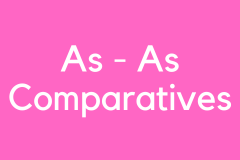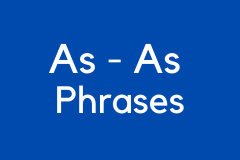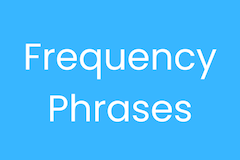Get Used To
Listen to four conversations using the grammar point.
Answer the following questions about the interview.
Get Used To
Point 1:
The modal verb phrase ‘be used to’
and ‘get used to’ express how a
person became familiar or accustomed to do
something.
- I am used to living alone. (It is easy.)
- I am not used to living alone. (It is not easy.)
- I am getting used to waking up early. (It is becoming familiar.)
- I am not used to getting up early. (It is still not each to do.)
Point 2: The verb phrase has three parts:
Subject + be + used to + gerund
Subject + get + used to + gerund
Question
- Are you used to driving in the rain?
- Are you getting used to driving on the left side?
- Have you gotten used to working from home?
- Have you gotten used to studying at home?
Affirmative
- I am used to working at a desk.
- She is used to dealing with difficult people.
- I got used to living with a roommate.
- They quickly got used to living without hot water.
Negative
- They aren’t used to working together.
- He isn’t used to eating with chopsticks.
- She hasn’t gotten used to working from home.
- She is used to driving a large car.
Point 3: Be used to vs. Get used to - There is a slight difference in meaning between the two forms. The verbs ‘get’ means there was a change in familiarity. The verb ‘be’ refers to the feeling always existing.
- I was used to being teased as a kid. (It was always the situation.)
- I got used to being teased as a kid. (I learned how to deal with teasing.)
Point 4:
The use of ‘be used to’ and ‘get used to’
changes by tense. Except for the present simple,
most forms use ‘get’ as the auxiliary.
Present tense (be: am, is, are)
- I am used to working alone.
- I am not used to cooking for myself.
- She is used to feeling tired.
Continuous (getting)
- I am getting used to studying online.
- I was just getting used to having you around, and now you’re leaving!
Past (was, were, got)
- I was used to being picked last as a kid.
- I didn’t like it, but I got used to it.
Gerund (getting)
- I am having trouble getting used to it.
Perfect (gotten)
- I haven’t gotten used to wearing a suit at work.
Point 5:
Pronunciation - The particle ‘to’ is heavily
reduced in natural spoken English.
- I’m used to living alone.
- I am slowly getting used to wearing a suit.
- She is used to being around kids.
- I’m still getting used to sharing my apartment with a roommate.
Point 5:
The gerund is often replaced with the pronoun
‘it’; but when this happens the particle ‘to’ is
pronounced clearly and not heavily reduced.
- Do you like working behind a desk?
1. No, but I am getting used to it. - I hate attending parties, but I am getting used to it.
- I loathed wearing a suit after college, but I got used to it.
Point 6:
In spoken English, if the gerund appears as the
subject of a sentence, the gerund or pronoun is
sometimes omitted. The particle ‘to’ is not
reduced and clearly pronounced.
- Living alone takes some time getting used
to.
- It takes some time getting used to living alone.
- Being criticized is something that he is not
used to.
- He is not used to being criticized.
- Driving at night took awhile getting used
to.
- It took awhile getting used to driving at night.
Main Text Goes Here










